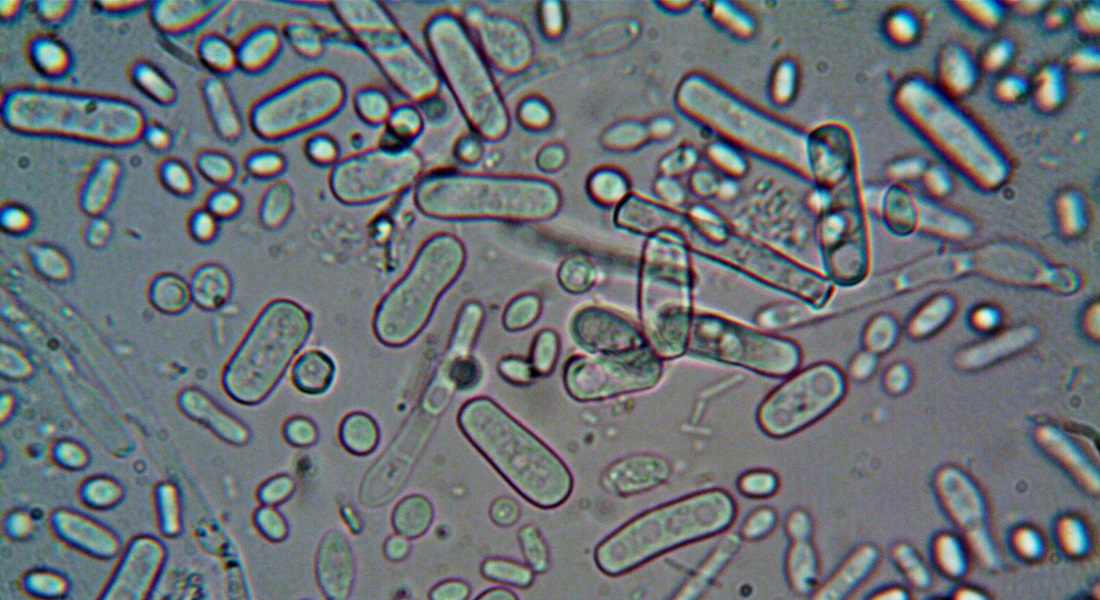Microbial interactions, biofilms, hygiene and safety

Microbial communities are fundamental to food production, influencing both food quality and safety. From fermentation to spoilage, bacteria play diverse roles, and while some microorganisms benefit food production, others can cause contamination. Understanding how these communities form, evolve, and interact is essential for improving food safety, reducing waste, and enhancing sustainability.
A key area of our research focuses on biofilms—bacterial communities encased in protective matrices. These biofilms can both challenge and benefit food systems. While biofilms contribute to bacterial resilience, they can also aid in biopreservation, helping extend food shelf life and prevent spoilage. By studying how biofilms form, evolve, and interact, we work on harnessing their potential for positive applications while managing their risks.
We also explore how microbial communities, including bacteria and microalgae, interact in food systems. Microalgae, for example, can serve as an alternative protein source and promote microbial balance. By understanding the synergy between these microbes, we seek to unlock new possibilities for food safety and sustainability.
Through a combination of classical microbiology, advanced imaging, and biofilm models, our work aims to improve food hygiene, reduce waste, and develop innovative preservation methods. By focusing on both the challenges and opportunities presented by microbial communities, we strive to create safer, more sustainable food systems.
Research Themes
Biofilms are structured communities of bacteria that attach to surfaces and are encased in a protective matrix. These biofilms play a crucial role in various environments, including food production, where they can contribute to both spoilage and foodborne outbreaks. Our research investigates how bacterial communities within biofilms interact, evolve, and adapt to environmental stress. We focus particularly on multispecies biofilms, which exhibit emergent properties that single-species biofilms do not, such as enhanced resistance. Our findings will help develop strategies to disrupt biofilm formation, improve disinfection protocols, and ensure food safety across industries.
Microbial communities are dynamic ecosystems where bacteria interact in ways that influence their behavior and resilience. In food systems, these interactions can be beneficial or harmful and impact both contamination, spoilage, or general food safety. Our research delves into how microbial communities evolve, adapt, and cooperate or compete within complex environments. By exploring the genetic and physiological mechanisms driving these interactions, we aim to harness beneficial microbial relationships while mitigating harmful effects. Additionally, we investigate the role of microalgae in microbial communities, exploring their potential to balance ecosystems and support sustainable food systems, particularly as an alternative protein source.
Bioprotection refers to the concept of using natural microbial communities to protect food from harmful pathogens and spoilage organisms. Our research focuses on developing biobarrier technologies that rely on beneficial microbial interactions to enhance food safety. These bioprotective strategies utilize the competitive dynamics between microorganisms to prevent the growth of pathogens, offering an eco-friendly and sustainable alternative to chemical preservatives. By improving microbial community resilience and understanding their ecological roles, we aim to reduce food waste, promote sustainability, and ensure the safety of food products across industries.
Ensuring food safety begins with effective hygiene practices and microbial quality assurance. Our research focus es on evaluating the effectiveness of cleaning and disinfection methods for removing microbial biofilms and contaminants from food production surfaces. We identify sources and pathways of microbial hazards and spoilage organisms in critical environments. By studying the stress tolerance and resistance of pathogens to different preservation strategies, including emerging technologies, we aim to define safety limits and improve food safety protocols, ensuring better control and more efficient prevention of contamination in industrial food production.
Understanding the complexities of microbial communities requires advanced analytical tools. Our research integrates cutting-edge techniques like confocal microscopy, high-throughput sequencing, molecular analysis, and computational modeling to study microbial behavior and interactions at the single-cell level. This multidisciplinary approach provides deeper insights into microbial dynamics, enabling us to develop targeted interventions that improve food safety and bacterial performance. By harnessing these technologies, we can address complex challenges in microbial management and contribute to more sustainable and efficient food systems.
If you would like to learn more about our research initiatives or explore collaboration opportunities, please do not hesitate to contact us. We would be happy to provide you with further information and discuss potential partnerships.
Contact
 Henriette Lyng Røder
Henriette Lyng Røder
Associate Professor
h.lyng.roeder@food.ku.dk
 Henrik Siegumfeldt
Henrik Siegumfeldt
Associate Professor
siegum@food.ku.dk
 Susanne Knøchel
Susanne Knøchel
Professor
skn@food.ku.dk
